Key takeaways:
- Market crashes evoke deep emotional responses and challenge perceptions of financial security, emphasizing the need for a solid investment strategy.
- A key to navigating market downturns is understanding triggers, such as economic factors and irrational investor behavior, which can influence decision-making.
- Maintaining a long-term perspective and practicing emotional resilience can prevent rash decisions during financial crises, fostering confidence in one’s investment philosophy.
- Engaging with a community and continuously enhancing financial education are vital for personal growth and recovery in the aftermath of a market crash.
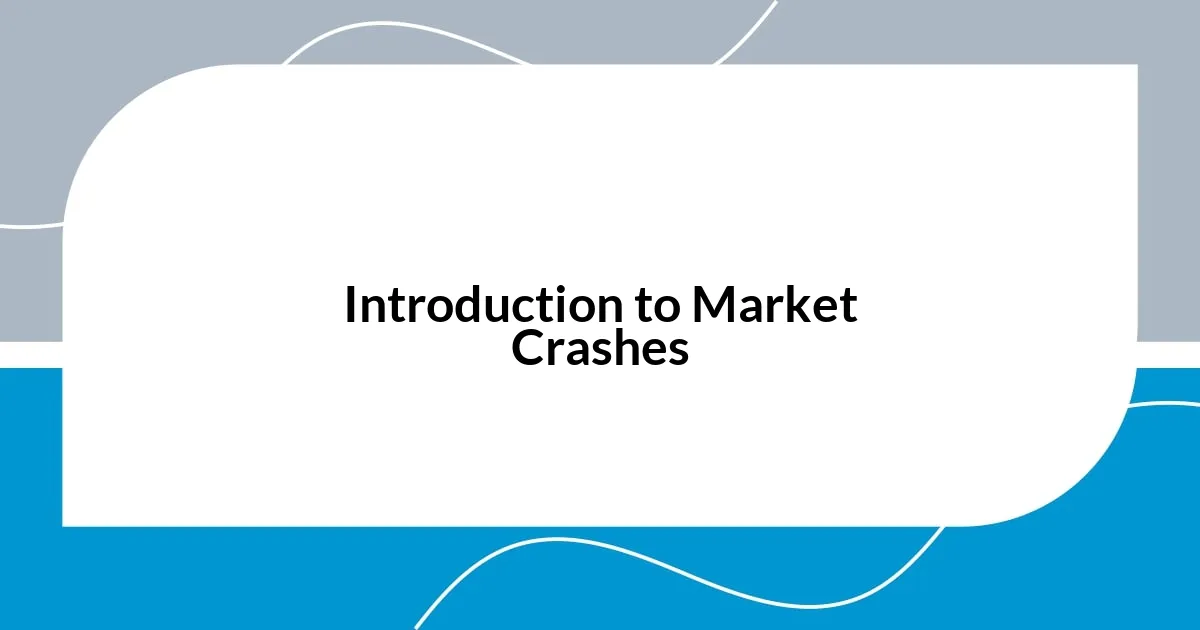
Introduction to Market Crashes
Market crashes can feel like being tossed into a storm without a life jacket. I remember vividly the panic in the air as news broke during the last significant downturn. The atmosphere changed from optimism to dread in the blink of an eye, making me wonder how quickly stability can vanish.
It’s interesting how something as abstract as stock prices can evoke such visceral fear. I often think about how these moments challenge our perceptions of security. When the market starts to plummet, it’s almost as if a wave of regret washes over many investors—should I have acted differently?
Reflecting on my experience, I realized that these crashes serve as harsh reminders of the inherent volatility in investing. While I faced moments of doubt, I also learned invaluable lessons about resilience and the importance of having a solid strategy. How do you prepare for something that feels so unpredictable? The more I pondered this question, the clearer my investment philosophy became.
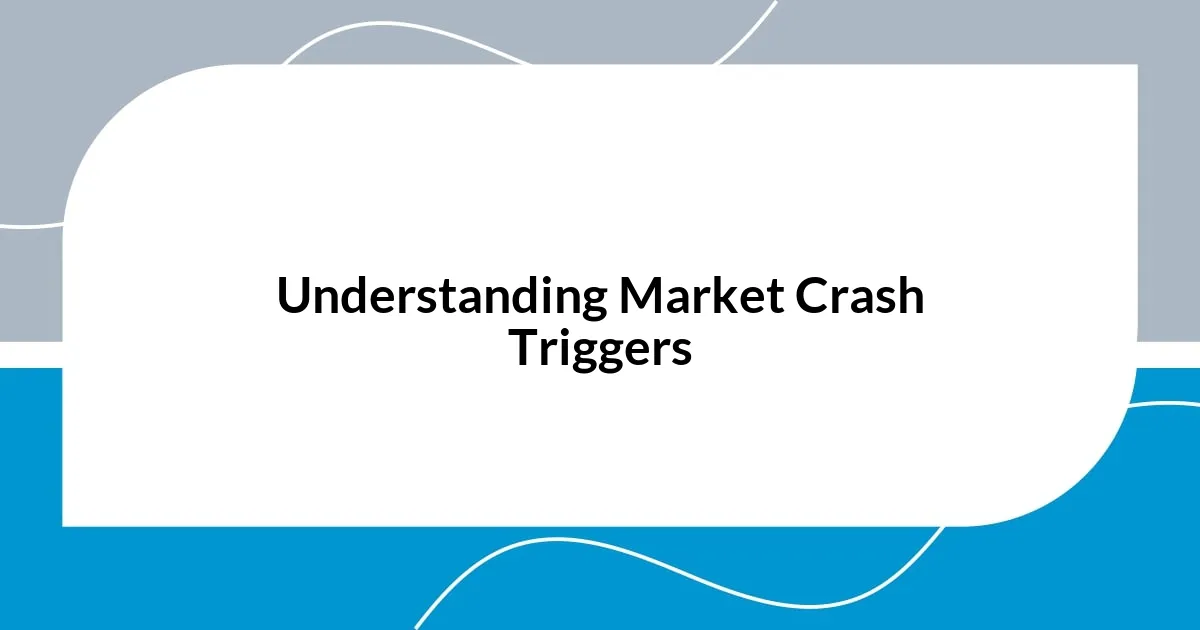
Understanding Market Crash Triggers
Understanding what triggers a market crash can be eye-opening. Often, it’s a perfect storm of economic factors, investor psychology, and unforeseen events. I recall a time when a sudden geopolitical event rattled investors’ confidence, causing a ripple effect that sent markets spiraling. This experience made me acknowledge how quickly external variables can unsettle a seemingly stable environment.
Here are some common triggers that can lead to a market crash:
- Economic Recession: Deteriorating economic indicators can trigger widespread panic among investors.
- Interest Rate Hikes: Rising rates can make borrowing costlier, leading to diminished spending and investment.
- Geopolitical Events: Unpredictable events such as wars or political unrest can destabilize markets.
- Market Speculation: Excessive speculation often inflates asset prices, making a sudden correction inevitable.
- Pandemics or Natural Disasters: These can halt economic activity and create uncertainty, leading to market declines.
It’s fascinating how one event can alter investor behavior, sometimes driving reason straight out the window. I’ve seen smart investors, who always seemed calm, suddenly second-guess their decisions. In those moments, fear can cloud judgment, amplifying the situation. It’s a vivid reminder that understanding these triggers isn’t just academic; it can shape how we respond in real-time during turbulent moments.
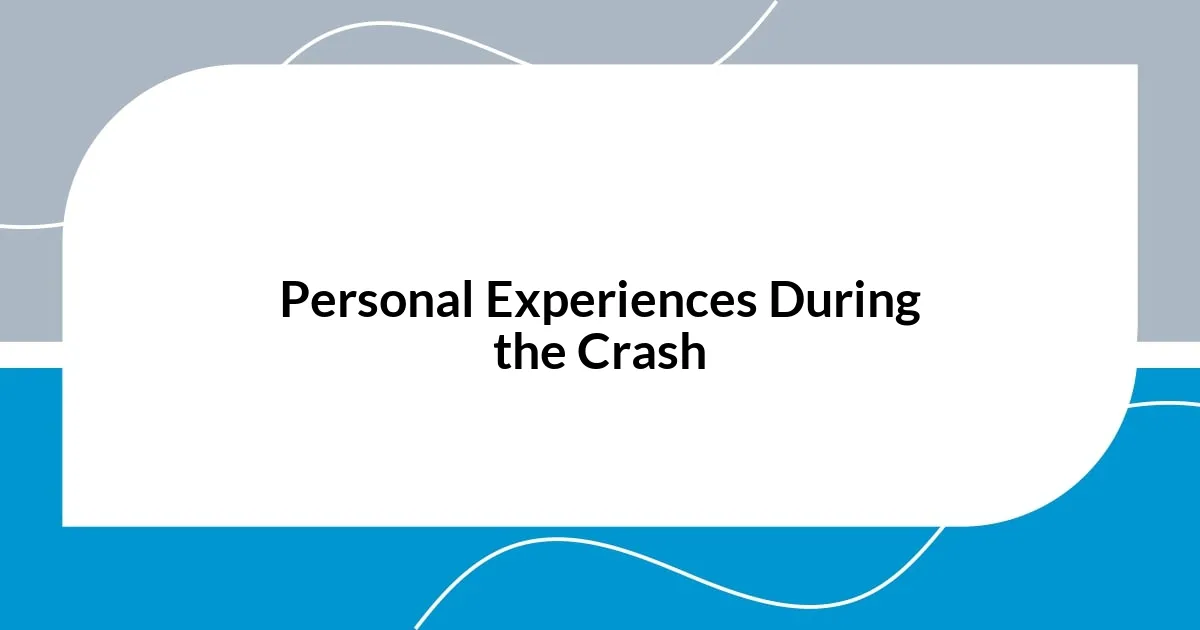
Personal Experiences During the Crash
During the crash, I felt a mix of anxiety and determination. I remember the moment I checked my portfolio and saw the numbers in freefall. Panic set in, but I realized that grounding myself would be key. Instead of diving headfirst into fear, I chose to analyze my investments critically. Staying calm amidst chaos truly tested my resolve.
I found myself reflecting on the conversations I had with friends and family during those uncertain days. Many of them panicked and sold off their stocks, while I held on to my strategy. The emotional weight of watching everyone around me react impulsively made me question my own decisions. In hindsight, it became clear that my ability to stick to my investment principles saved me from making rash choices.
It’s intriguing how close-knit relationships can either bolster or undermine our confidence during market downturns. I could feel the tension over coffee chats as friends expressed their fears, swayed by negative news. Interestingly, I discovered that the more I communicated my investment philosophy, the more I could help alleviate their concerns—transforming fear into informed dialogue.
| Experience | Emotional Insight |
|---|---|
| Panic upon checking portfolio | Feeling anxious but resolved to analyze |
| Friends selling stocks impulsively | Questioning my own decisions |
| Transforming fear into dialogue | Helping friends with investment philosophy |
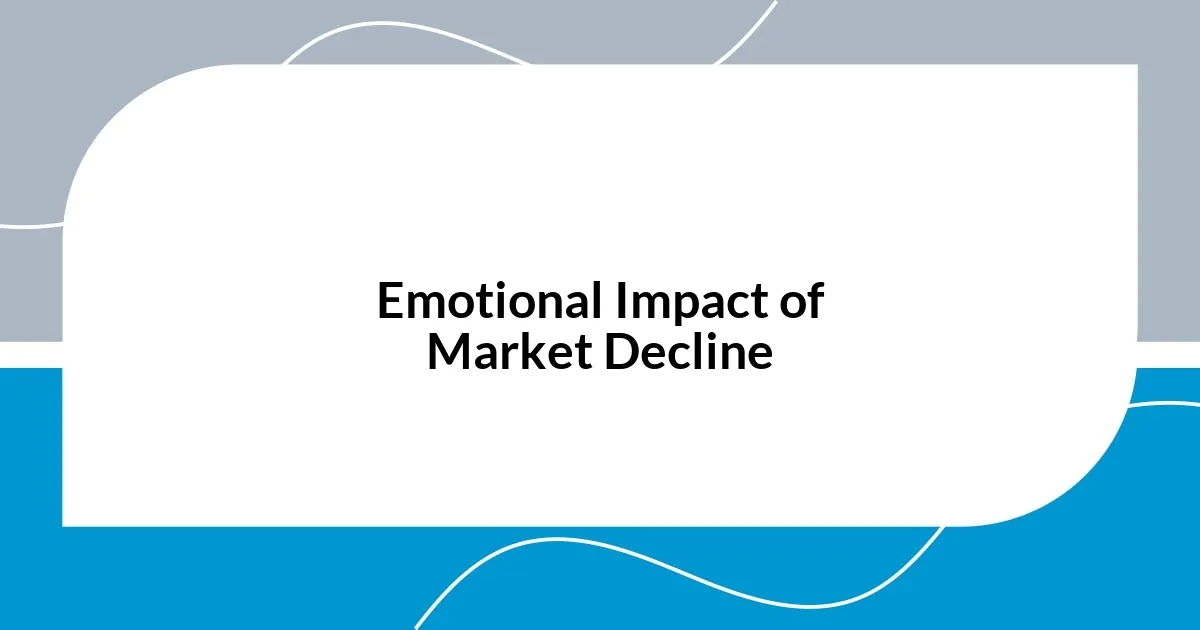
Emotional Impact of Market Decline
I remember sitting in my living room, feeling like the walls were closing in as the news headlines screamed about the market’s plummet. The fear in the air was palpable, and it felt like my heart was racing alongside the market indices. My mind raced with questions—was I smart for sticking to my long-term plans, or was I completely deluding myself? That internal dialogue was exhausting but necessary; I had to remind myself that emotions are temporary, but my investment strategy had merit.
As days dragged on, I started noticing how emotionally taxing it was to see friends grapple with their financial futures. One evening, a close friend called me, her voice shaky as she spiraled into panic over her dwindling stocks. Her fear was contagious, and I, too, felt an urge to abandon my own strategy. But stepping back, I reflected on my principles and shared them with her. It became clear that what we often need during those turbulent times is reassurance—not just from the market, but from our own beliefs.
The emotional impact of a market decline can feel isolating, yet it’s almost universal. How often do we tie our self-worth to market performance? I found myself journaling during those weeks, pouring out my thoughts, fears, and occasional glimmers of hope. It helped me process everything—a practice I continue to this day. In those moments, I learned an invaluable lesson: staying grounded in oneself can offer clarity, even when the world feels chaotic.
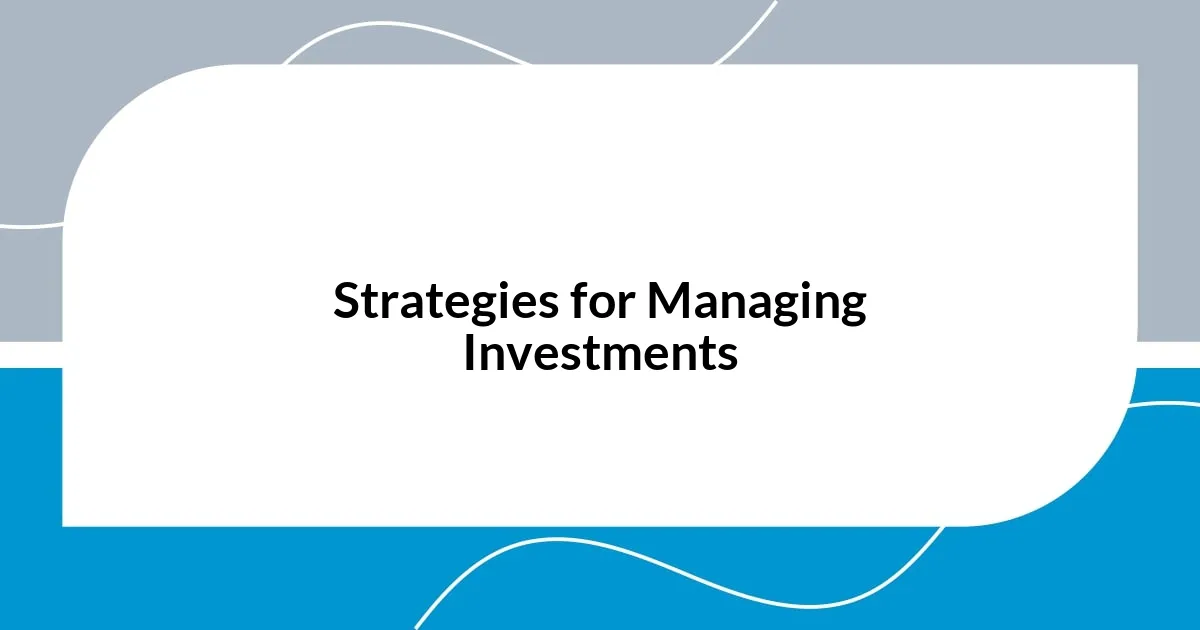
Strategies for Managing Investments
During the market crash, I quickly realized that diversifying my portfolio was more important than ever. I had always been a firm believer in not putting all my eggs in one basket, but witnessing the downturn reinforced that approach. When one sector tumbles, having investments in different areas can cushion the blow and help avoid greater losses.
I remember feeling the urge to make quick, reactive decisions in the face of chaos. However, I chose to sit with my emotions for a moment and ask myself, “Are panic sales really in line with my long-term goals?” This pause allowed me to reevaluate my situation and ensure my reactions were rooted in logic rather than fear. It’s incredible how taking a step back made me focus on my long-term objectives instead of getting swept up in the moment.
Another strategy that anchored me during those turbulent times was routine rebalancing. I decided to routinely assess my investment allocation, which helped me stay aligned with my risk tolerance. I recall a conversation with my advisor who suggested setting up alerts for portfolio reviews—something I found incredibly empowering. It became a proactive way to engage with my investments rather than reacting to them. Have you considered how regular check-ins might change your perspective on market fluctuations? It’s a simple yet powerful practice I now swear by.
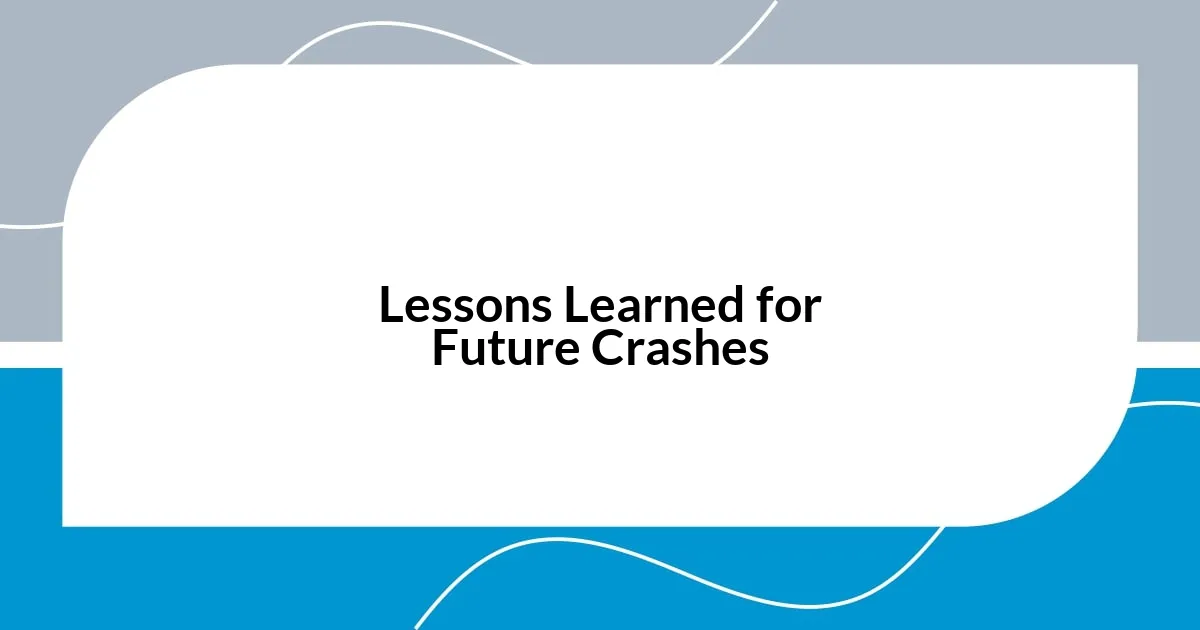
Lessons Learned for Future Crashes
Reflecting on my experience, one crucial lesson is the significance of maintaining a long-term perspective. In the heat of the market crash, I often reverted to thinking too short-term, which was driven by fear and anxiety. I started asking myself, “What’s my financial vision in five years?” This simple question pulled me back to my strategy, reminding me that temporary dips shouldn’t derail my overarching goals. In essence, I learned that having a well-defined plan can serve as an anchor amidst the volatile tides of emotions.
One other powerful insight was the value of emotional resilience. I remember watching my peers react impulsively, selling off their holdings in a frenzy, driven by fear rather than rational thought. I, too, felt that urge, yet each time I resisted, I noticed my confidence grow. I asked myself, “What will prove more beneficial: quick decisions in panic or steady decisions based on research?” This mental framework helped me cultivate a calm demeanor, making me realize that my emotional reactions were as important to managing my investments as financial knowledge.
Lastly, I’ve learned that seeking community and support is essential during tumultuous times. I remember participating in online forums where investors shared their stories and strategies, which alleviated the weight of uncertainty. I think back on it and wonder: how might collective wisdom broaden my perspective? Engaging with others helped me understand that I wasn’t alone; we were all navigating the storm together. This camaraderie became a vital part of my experience, fostering not just financial insights but emotional strength as well.
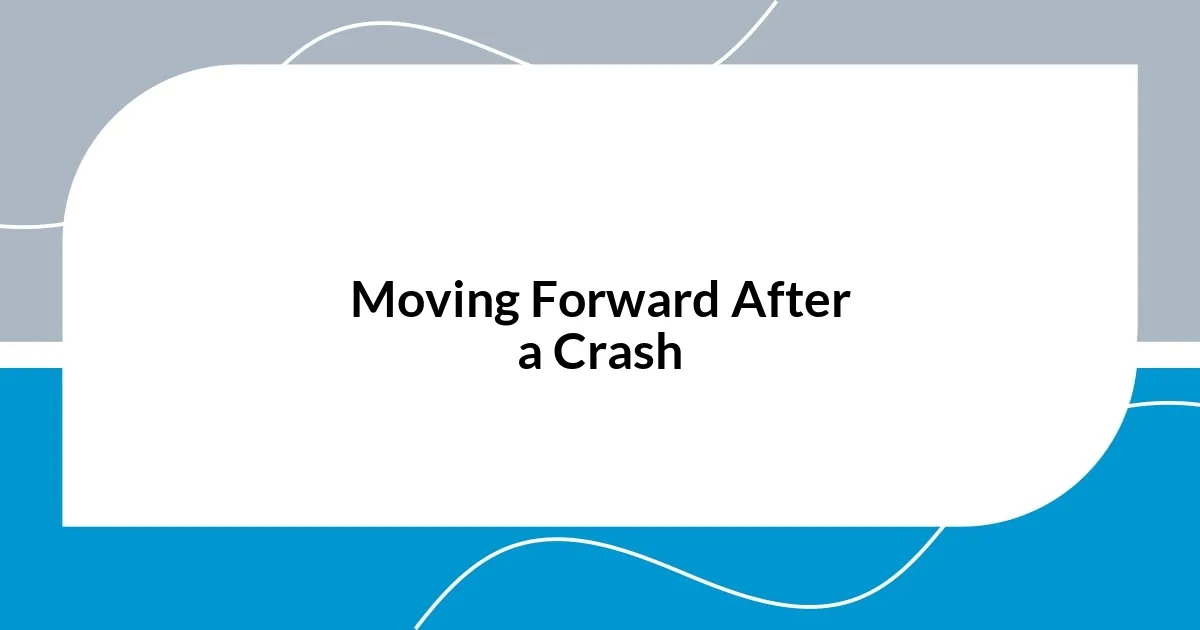
Moving Forward After a Crash
Moving forward after a market crash can be daunting, yet it’s often during these challenging times that I discovered new pathways for growth. I recall vividly sitting at my desk, looking at my screen full of red numbers. Instead of panicking, I took a deep breath and reminded myself that investing is not just about the immediate losses; it’s about what I can learn from them. What if I shifted my focus from the current crisis to opportunities that arise in its aftermath?
As I navigated the post-crash landscape, I found that reinvesting in my financial education was crucial. I enrolled in online courses to deepen my knowledge about market trends and economic indicators. Then there was this moment when I stumbled upon an informative podcast that dissected past market recoveries. I realized how important it is to understand the context of my investments—not just the numbers. Inviting this knowledge into my strategy made me feel empowered. Have you ever thought about how continuous learning can impact your future decisions?
Lastly, I embraced the importance of patience. After the crash, I felt a mix of anxiety and hope; it was a rollercoaster ride. However, I decided to take a long-term view. I started asking myself, “How can I use this time to rebuild and strengthen my portfolio?” This reflection taught me that recovery isn’t immediate; it’s a journey that unfolds over time. I began to trust the process. Watching my investments slowly stabilize rekindled my faith in a balanced approach, reminding me that resilience isn’t just about surviving—it’s about thriving in the long run. Isn’t it remarkable how a shift in perspective can alter the entire trajectory of our decisions?